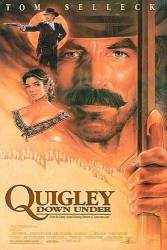Character mistake: In the scene where Quigley engages Marsten's men who are attacking the Aborigines, we see a man hit by a bullet and fall from his horse, then we hear the report of Quigley's rifle. When the man who gets away reports to Marsten, he estimates the range at three-quarters of a mile maybe. Marsten asks him how long after the bullet struck before he heard the report of the rifle. He answers two maybe three seconds. While this scenario would be plausible for a more modern high-powered cartridge like the .30-06, it is not accurate for the .45 2-7/8 Sharps Quigley is using. That cartridge loaded with 110 grains of black powder will propel a 540-grain bullet (best case) at around 1475 feet per second. Since the bullet is supersonic when it leaves the muzzle it will indeed precede the sound of the weapon's discharge for short distance. But not by very much and not for very long. The bullet goes transonic in about 400 yards and the the sound waves catch up to the bullet a little beyond 600 yards. After that, the rifle's report, travelling at a constant speed, gets progressively further AHEAD of the bullet which is gradually slowing. At three-quarters of a mile (1320 yards) the bullet's time of flight is about four seconds, while sound waves travel that same distance in three-and-a-half seconds. The man should have been struck at nearly the same time as, or up to half-second AFTER the report, depending on the actual range.
Character mistake: Quigley refers to his Sharps Rifle as a lever action. The Sharps are a falling block action. It utilizes a lever to open the breech, but it is not a lever action like a Winchester Model 94 or 92.
Character mistake: When Cora is cradling the Aborigine girl whom she gave the red button to after she had been shot and "killed", if you watch the girl you can see she's still breathing.






Answer: He felt that if Quigley fought Marston he might have been killed. He hit him to save his life.
SantaJim